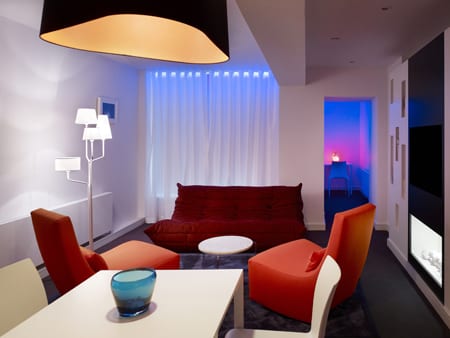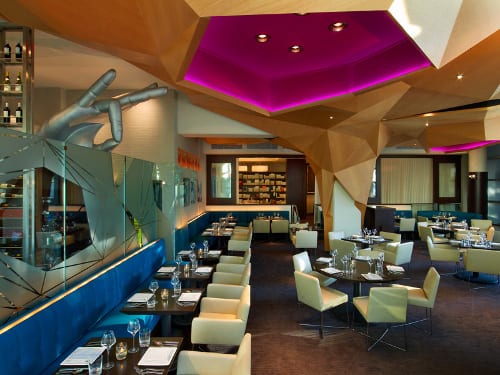 On the occasion of the 20th anniversary of design, procurement, and development firm Gettys, we decided to sit down with chairman and CEO Roger G. Hill II, to discuss two decades of innovation and reinvention in our industry. Hill co-founded Gettys with fellow Cornell School of Hotel Administration graduates Andrew Fay, Ariane Steinbeck, and Julius van Heek, choosing Hill’s middle name for their shingle, and bringing a business mindset to hotel design. Headquartered in Chicago, Gettys has recently expanded to offices in Dubai, Hong Kong, Irvine, California, Miami, and New York. After more than 600 projects, Hill talks about innovation, the firm’s first Far East hotel, and that secret sauce.
On the occasion of the 20th anniversary of design, procurement, and development firm Gettys, we decided to sit down with chairman and CEO Roger G. Hill II, to discuss two decades of innovation and reinvention in our industry. Hill co-founded Gettys with fellow Cornell School of Hotel Administration graduates Andrew Fay, Ariane Steinbeck, and Julius van Heek, choosing Hill’s middle name for their shingle, and bringing a business mindset to hotel design. Headquartered in Chicago, Gettys has recently expanded to offices in Dubai, Hong Kong, Irvine, California, Miami, and New York. After more than 600 projects, Hill talks about innovation, the firm’s first Far East hotel, and that secret sauce.

HD: Your background—and that of your partners—includes a degree from the Cornell School of Hotel Administration. Has this helped you focus on the business of the hotel business, and has it influenced your design work?
RH: Yes it has. It’s helped us both focus and see the opportunities, and create a business focused solely on the hospitality business. When we had the vision to come up with the business model, 20 years ago, there were developers and brands that understood the value of good design, but not nearly as many as there are today. That’s part of where we saw opportunity; we could combine great design and a great brand. And that’s become table stakes today; 20 years ago that was the minority of thinking. You couple that with the standard then of a developer hiring a procurement firm, project manager, interior designer, program manager, architect of record—we understood that we could accept the responsibility for all of that and be accountable for all of it. We also understood that you can do a lot with a little, and I think that is what we’ve always prided ourselves on. We are just continuing with that focus, not only to come up with the big vision, but we held the responsibility for executing it successfully.
HD: When you founded Gettys, you said a few notable things about your business approach to hospitality design. Would you mind reciting those tenets?
RH: I said that we build profit centers, not monuments. The world has changed since then, but the tenets of our ‘great design is good business’ approach remain the same at Gettys. It is this approach that has helped this organization grow from four principals to six offices. First and foremost, we’re an excellent design firm that balances great design with business acumen.
HD: Gettys has always remained focused on the future. Why is that part of your firm’s DNA?
RH: I think because our foundation was built on the fact that we are all entrepreneurs. We wanted to continue to create an environment to attract entrepreneurial people.

HD: How do you attract those people?
RH: You are looking for somebody who has a lot of skills, but also somebody who continues to learn—people who understand that’s what life is about. We’re smart enough to know we want to reinvent ourselves, and the right people will help us continue to become better. We always want to refine ourselves—it’s part of our core values. That’s not the case at a lot of firms where it’s my way or the highway.
HD: You mention core values. What is most critical to Gettys?
RH: We treat people the way we want to be treated. That’s why our average tenure of our leadership team has been here over a decade. We share the successes and the challenges. We’re about the global pronouns—we and our. We approach things collaboratively. Even with our clients, we share the successes and the challenges. That kind of thinking is paying off in spades; a lot of people we’ve treated graciously over the years now look to us to help them in the downturn.
HD: What have you changed design-wise, that shows you were thinking differently?
RH: I think we were thought leaders particularly when it comes to mass customization. We have evolved our Guestroom Express™ program since we launched it in 1994, originally as a way for developers to get good, cost-effective design that could be evaluated quickly as meeting or exceeding brand standards, and for knowing pre-schematic what the costs are—a dealer model. The idea came from a project we did for a major fast-food chain, helping them create a series of designs for their restaurants. We thought if it was appropriate for restaurants it should be appropriate for hotels. That’s not to say everybody buys that way, but it was a nice alternative. A lot of our competition has gone on to emulate us, and we think that is the finest compliment.

HD: Does your creativity focus on the investment, that is, on the business owner?
RH: We pride ourselves on understanding from the hotel owners’ perspective what the business objectives are. We really want to understand the competitive set, and the customers. We can define the design, programming of the project, procurement; we then balance this with the investment objectives.
HD: Are you doing things differently now than you were a decade ago?
RH: People are recognizing the "secret sauce"—which is no secret. It’s a good formula, the way we go in and make an opportunity assessment. Under opportunity, there might be redevelopment or the strategy for new development. We want to be held accountable to execute that.

HD: What is different from just a year ago?
RH: We’re a global company. It’s been a good defensive move due to the slowdown in the States. In retrospect, it was a smart decision and we’re very thankful. We never anticipated we’d be in the economic malaise we’re in right now.
HD: Are there areas on which you’re bullish?
RH: We’re bouncing along the bottom of tough times. For those who are opportunistic, there are fantastic opportunities for acquisitions. We are seeing some light and it’s a ray of sunlight; I couldn’t have said that in January. I truly felt in my lifetime I wouldn’t have experienced this in the way my parents experienced something as dramatic as the Great Depression.
HD: You mention your parents. I understand that your father had been a positive influence on the firm. What did he teach you?
RH: He and my mom were very much entrepreneurs. He was a great mentor and one of my best friends. He played a key role in giving us the courage to start the business. He was our de facto controller and CFO in the early days. He was a great guiding influence and a great inspiration. He was a great gentleman, too. He taught us how you can be a very good businessperson, yet he was all about everybody winning.

HD: You have always championed innovation—in design, in services, in sustainability, in technology, in the future of design. As an industry, how are we embracing innovation?
RH: Unfortunately, as an industry, we’ve been a late adopter. LEED (Leadership in Energy and Environmental Design) will continue to gain momentum. We’ve been fortunate enough to take some risks. We just opened the Hotel Felix, an eco-friendly boutique hotel, designed to meet LEED® Silver Certification. We’re continuing to stay true to that mission of innovation, and LEED is an important differentiator. Our big thing is staying passionate about LEED, and using Felix as a laboratory. People who do environmentally sensitive design are going to be rewarded. I’m glad we’ve spent the money and time. There’s good return on it.
HD: As an expert on the ROI of good design, how do you convince owners that design relates to profitability?
RH: It was more of a vision, but what’s occurred in retail and automotive is good design equals good value. There are a lot of ways to use good materials sensibly and balance looking good with lifecycle costing. Spend a little money wisely and charge more for the room. It should not ugly out and wear out. When we started, the industry was a symphony of mauve. We pushed balancing good design with good functionality.

HD: You recently wrote extensively about how hoteliers can survive and thrive in the downturn of 2009. Do you believe solid design is part of the survival strategy?
RH: If you own a hotel now, you will be able to get the best tradespeople to work on your hotel, and the best value. There’s no better time to make a commitment to your asset. Spend wisely now when you’re not interrupting your highest occupancy. We’re fortunate enough to be working for people with that vision. Renovations are not as big, but those owners will be ready to take advantage of the upturn. New supply is really being choked off here, so recovery will be much faster in the hotel business. Owners will regret not having renovated for less money and less displacement.
HD: Some experts have predicted that oil will wane, that business will become more local, that we won’t have access to global travel in the same ways we do today. How do you address those challenges?
RH: I tend to disagree with the pundits in terms of global travel. With the emerging middle class in India and China you’ll see unprecedented numbers of people visiting gateway, world-class cities. In the future, I think global travel will ultimately recover and continue to grow.
HD: You talk so much about not relying on tried-and-true formulas for design, especially in luxury boutique hotels. Where does Gettys find inspiration for taking design risks?
RH: We take inspiration from fashion, food, dining, and we take advantage of access to and information from different markets. We’re sensitive to local customers, but we also think globally. We go through DNA exercises where we very much immerse ourselves in the programming, and in the competitive set. We have two- or three-day sessions that provide a roadmap to success in budget, design, and timeline.

HD: Gettys has completed more than 600 projects. What stands out? What are the lessons for the future?
RH: We were brought to Macau for a project, and ended up opening up an office in Hong Kong. That was a game-changing opportunity for us. We have experienced the same thing in Florida, Dubai, and New York. People in the financial markets want our expertise. We want to be in the war room when they are determining what happens with their assets.
HD: What advice do you have for businesses that really want to think—and work—differently?
RH: Surround yourself with people smarter than you, and always be willing to change.
Project photos from top: Hotel Cass, Chicago; the restaurant at Hyatt Regency Cancun; a mockup of a guestroom at Mandarin Oriental Guangzhou, China; a guest bath at Hilton Hartford, Hartford, Connecticut; a spa treatment room at Westin Abu Dhabi; a rendering of a villa at Newport Entertainment and Commercial Center, Manila, Philippines; and the lobby at the Chelsea, Atlantic City, New Jersey.


